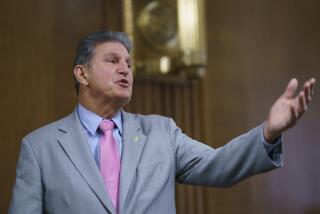Trim Trade Imbalance by Cutting Deficit, Congress Told
- Share via
WASHINGTON — During two days of testimony on Capitol Hill this week, experts on U.S. economic relations with the Far East gave Congress some advice it probably did not want to hear: The best way to deal with the nation’s huge trade deficit is to leave trade policy alone and get serious about the budget deficit.
The symposium, organized by Rep. David R. Obey (D-Wis.), chairman of the Joint Economic Committee, was dedicated to the ever-widening American trade deficits with Japan and the other fast-growing Asian economies of the so-called Pacific Rim. The participants--a mixture of academics, bankers and officials from earlier administrations--achieved a broad consensus on a few main points:
--Japan is succeeding the United States as the world’s chief supplier of capital, as the United States succeeded Britain as a financial center earlier in this century.
U.S. Trade Seen Growing
--Despite growing trade deficits with Korea, Taiwan, Hong Kong and Singapore, American trade and investment in those areas are growing at a healthy clip.
--Only continued development of the Japanese economy will help the new weak-dollar, strong-yen exchange relationship slow the huge trade surpluses Japan now has with the United States and most other non-oil-exporting countries.
--If the United States embraces protectionism, it will help push Japan into recession, diminish trade in the whole Pacific region and, in the long run, eliminate American jobs.
The experts generally agreed that imbalances between U.S. and Japanese economies are structural and probably unavoidable. According to panelist Thomas K. McCraw of the Harvard Business School, the best-organized component of the Japanese economic system is industrial production, and the strongest sector of the U.S. economy is sales and distribution.
Not surprisingly, then, McCraw explained, Japan lives by producing goods that it does not consume, and the U.S. economy consumes more than it produces.
Those tendencies are aggravated by the fact that the Japanese have the highest personal savings rate in the world, far offsetting Tokyo’s steep government budget deficits. Japan’s national debt, McCraw noted, has quadrupled from 10% of gross national product in 1975 to 42% of GNP in 1985.
Low Savings Rate
During the same period, the U.S. federal debt moved from 37% of GNP to 46%. But the American private savings rate--at less than 4% of disposable income or about one-fourth the Japanese rate--is among the lowest in the developed world. Inevitably, the result is an unprecedented American hunger for foreign capital to invest--and spend.
Much of that investment comes from Japan, which has deregulated its banking system in such a way as to free billions of dollars for investment abroad.
For the time being, noted Kent Calder, a Japan specialist at Princeton, the system works well. While the bulk of foreign investment in the United States last year went into corporate stocks and bonds, Japanese investors poured $19.2 billion directly into U.S. Treasury securities--the equivalent of two-thirds of all direct foreign purchases of Treasury debt in 1985 and equal to 13% of all net new Treasury financing.
“Japanese capital outflows have thus crucially financed American global commitments, including a sustained military buildup, at a point where economic weakness would otherwise have forced cutbacks or politically delicate tax increases,” Calder said. “These capital flows have, in a word, underwritten U.S. global hegemony. They have made Japan in a sense America’s preeminent strategic partner, despite its low military spending.”
However, the experts shared another, less exhilarating, long-range conclusion:
A U.S.-Japan relationship in which Japan pours dollars into U.S. government and private securities, and in which most of those dollars recycle back to Japan to buy Toyotas and VCRs, is unsustainable.
Risk of Recession
If unbroken, the experts warned, the cycle will eventually push down the value of the dollar and inflate U.S. interest rates to late-1970s levels, causing as serious a recession as that of 1980-1982.
To avoid that, the experts agreed, the U.S. deficit must be reduced, thereby slowing the demand for foreign capital. If that occurs, the trade deficit will begin to swing back into balance, they said.
More to Read
Inside the business of entertainment
The Wide Shot brings you news, analysis and insights on everything from streaming wars to production — and what it all means for the future.
You may occasionally receive promotional content from the Los Angeles Times.










